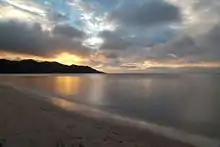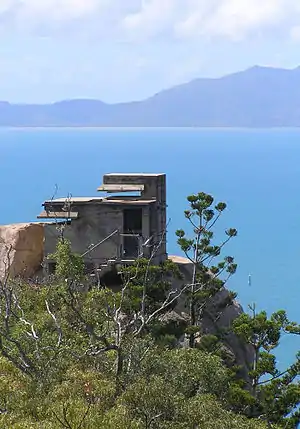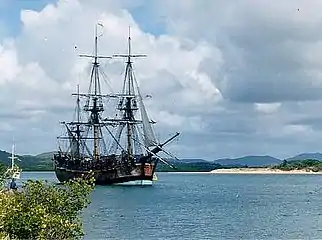Magnetic Island
Magnetic Island, known to its Indigenous inhabitants as Yunbenun, is an island 8 kilometres (5.0 mi) offshore from the city of Townsville, Queensland, Australia. This 52 km2 (20.1 sq mi) mountainous island in Cleveland Bay has effectively become a suburb of Townsville, with 2,335 permanent residents.[1] The island is accessible from Townsville Breakwater to Nelly Bay Harbour by ferry. There is a large 39.5 km2 (15.3 sq mi)[2] National Park and bird sanctuary and walking tracks can be taken between the populated bays and to a number of tourist destinations such as the World War II forts.
 The view of Magnetic Island from the Castle Hill, Townsville | |
 Palm Islands location | |
| Geography | |
|---|---|
| Location | Coral Sea |
| Area | 52 km2 (20 sq mi) |
| Highest elevation | 497 m (1631 ft) |
| Highest point | Mount Cook |
| Administration | |
Australia | |
| Demographics | |
| Population | 2,107 (2006) |
| Pop. density | 40/km2 (100/sq mi) |

The island is a holiday destination with many hotels and several resorts in operation to cater for all levels of service. The public facilities and infrastructure on the island are managed by the Townsville City Council. The island is part of the electoral district of Townsville in the Legislative Assembly of Queensland. The island is also part of the Federal seat of Herbert, which is represented by Phillip Thompson.
There are five settlements, namely Arcadia, Horseshoe Bay, Nelly Bay, Picnic Bay, and West Point. Geographic features include Rocky Bay, Picnic Bay and Hawkings Point, around its southern extremity, a bay, Nelly Bay to the east-north-east of Rocky Bay, followed by Geoffrey Bay, with Bremner Point as its northern arm. Horseshoe Bay is on the northern coast, and Cockle Bay Reef off the western coast.
Naming
The name of the island came about because of the apparent "magnetic" effect it had on the ship's compass of Captain Cook as he passed the island when sailing up the east coast of Australia in 1770.[3] People have since explored the general area of Magnetic Island with various instruments to discover what might have caused the effect that Cook reported, but nothing has been discovered. Local names for the island are "Maggie Isle",[4] "Maggie Island",[5] or "The Island".
History
Pre-European settlement
The island is called Yunbenun, by the Wulguru, its Indigenous inhabitants. It had a transient population of Aboriginal people well before European exploration of the area. They had seasonal camps at a number of bays, and travelled between the island and mainland using canoes. A number of Aboriginal burial sites are said to exist on the island, but have so far not been identified. Aboriginal middens and cave drawings can still be found in a number of bays around Magnetic Island. Folklore of the local Wulguru tribe recounts a long association with the island and annual migrations to the mainland to avoid expeditions of head-hunters from Papua New Guinea and the Torres Strait, which used the northern trade winds to travel south along the Queensland coast. This head-hunting nearly ceased following the arrival of missionaries, led by Samuel MacFarlane to the Torres Straits in 1871.[6]
The first European accounts of the island come from Captain James Cook who, in 1770, while navigating the Australian coast, called the island Magnetical Island, as a magnetic pull interfering with his vessel's compass appeared to emanate from the island. J.M. Black, funded by Robert Towns, founded the township of Townsville on the mainland nearby. As Townsville developed through the mid-19th century, Magnetic Island became a valuable location for the gathering of hoop pine and granite, the latter of which was used in the reclamation of land for the Port of Townsville, and for construction of Townsville's Customs House.[6]
European settlement and development

Picnic Bay was named after its popularity as a picnic spot for European tourists from the mainland during the 19th century, before Magnetic Island was first inhabited by Europeans. In the mid-19th century the island became a popular location for the collection of stone and coral needed for development on the mainland. Even substantial quantities of gold were mined in 1886.[7]
In 1875, the island was set aside as a quarantine station although it took another ten years for the proper facilities to be set up at West Point. In November 1884 the Queensland Government accepted a tender from Leisner and Sparre to construct the quarantine station for £3645.[8] It was only after the tender was accepted that the site on West Point on the north-west was actually chosen.[9]
In 1896 Cyclone Sigma tore across the island and through Townsville.[10] At least 23 lives were lost, many buildings destroyed and boats wrecked.[11][12][13] The ketch Lalla Rookh was torn off its moorings and found later on Magnetic Island.[14] (She was able to be recovered and continued to carry loads of timber up and down the coast, until being wrecked off the Queensland coast in 1899.[15][16][17])
By 1890 a resort had been started in Picnic Bay. In 1898 Robert Hayles Sr was so impressed by the potential of Magnetic Island he sold his other interests to build a resort on the island. Hayles was responsible for much of the development of Magnetic Island through tourism. In 1901 he started a regular ferry service to the island with his ship the Bee. Twelve months later this ship was wrecked on the rocks at Nobby Head, Picnic Bay, and the Phoenix was built by Hayles' sons to replace the vessel. The Hayles company remained operating services to Magnetic Island with a large number of different vessels until 1988.
World War II


Magnetic Island became an important defensive position during World War II because of its proximity to Townsville, an important military base, and its views over Cleveland Bay, a significant anchorage and assembly point for large fleets and convoys operating in the south Pacific. As such, the Magnetic Battery, (AKA The Forts) an artillery battery and observation post, was built in the hinterland of Florence, Horseshoe and Arthur Bays. Picnic Bay also became a popular defence force rest and relaxation camp following the commandeering of a resort in the bay in 1939.
Post-war era
The island slowly expanded following the end of the Second World War. In late December 1971 Cyclone Althea hit the North Queensland coast directly crossing Magnetic Island. The island, along with much of the mainland, was devastated with 90% of the island's houses damaged or destroyed, some simply lifted off their foundations and tossed into trees. The island, along with the mainland, soon recovered.
In July 2012, a six hectare section of the island was granted to the Wulgurukaba Yunbenun Aboriginal Corporation under freehold title and a further 55 hectare section under a Deed of Grant in Trust.[18]
Geography
Geographic features include Rocky Bay, Picnic Bay and Hawkings Point (around the settlement named Picnic Bay) around its southern point,[20] a bay and settlement called Nelly Bay to the east-north-east, Horseshoe Bay on its northern coast, and Cockle Bay Reef off the western coast.[21][22]
Natural heritage and attractions

The island is a haven for wildlife. 76% of the island is Magnetic Island National Park,[23] which is mostly located on the steep hilly interior and rugged north-western side. The highest point on the island is Mount Cook reaching 497 m (1,631 ft) above sea level.[3]
Magnetic Island is famous for its angling opportunities. Fish around the island include: blue marlin, black marlin, sailfish, mackerel, wahoo, giant trevally, coral trout, mahi-mahi, tuna, red emperor and sea perch.
As of 2013, there are over 800 koalas estimated to be present on the island; this population represents the northern limit of their geographic range.[24]
The areas of the island that are not covered by the conservation area are open for development subject to local authority approval. As of 2018 the island was undergoing an economic boom.
The wreckage of SS City of Adelaide is located off the shore of Cockle Bay, the island and is a popular tourist attraction.[25]
Settlements
The five villages of the island, which contain the lion's share of the population of 2017 (as of the census of population)
| Place | Area (km2) | Population | Density |
|---|---|---|---|
| Horseshoe Bay | 9.7 | 484 | 49.9 |
| Arcadia | 5.2 | 257 | 49.4 |
| Nelly Bay | 5.2 | 973 | 187.1 |
| Picnic Bay | 2.8 | 359 | 128.2 |
| West Point | 28.4 | 35 | 1.2 |
| Magnetic Island | 51.3 | 2107 | 41.1 |
Heritage listings
Magnetic Island has a number of heritage-listed sites, including:
- East side of island: Fort Complex[26]
- Esplanade: Picnic Bay Jetty[27]
Education
There is a primary school at Nelly Bay. The nearest secondary school is Townsville State High School in Railway Estate in the Townsville mainland.[28]
Community groups
The Magnetic Garbutt branch of the Queensland Country Women's Association meets at the CWA Hall at 42 Lancaster Street, Garbutt.[29]
Annual events
Annual events include:[30]
- Great Tropical Jazz Party (August)
- The Great Island Trek (September)
- Maggie Island Triathlon (October)
- SeaLink Magnetic Island Race Week (August/September)
Notable residents
- Julian Assange, WikiLeaks co-founder, sporadically lived the first years of his life in Nelly Bay with his mother in the early 1970s.[31]
See also
References
- Australian Bureau of Statistics (27 June 2017). "Magnetic Island (Statistical Local Area )". 2016 Census QuickStats. Retrieved 27 June 2007.

- Science, jurisdiction=Queensland; sector=government; corporateName=Department of Environment and. "Magnetic Island National Park — facts and maps". wetlandinfo.des.qld.gov.au. Retrieved 28 January 2021.
- "Magnetic Island". Encyclopædia Britannica. Encyclopædia Britannica Online. Archived from the original on 28 October 2009. Retrieved 3 July 2009.
- Hughes, Holly; Murphy, Sylvie; Flippin; Alexis Lipsitz; Duchaine, Julie (2010). Frommer's 500 Extraordinary Islands. John Wiley & Sons. p. 357. ISBN 978-0-470-59518-3. Archived from the original on 5 November 2013. Retrieved 31 October 2016.
- "Queensland Islands – The top 5 QLD island holiday locations". LeisureCom Group Ltd T/A Discover Queensland. Archived from the original on 23 June 2013. Retrieved 30 September 2013.
- Barnes, Tom (1997). Peaceful Isle - Story of Magnetic Island from 1960s. Magnetic Island, Queensland, Australia.
- Science, jurisdiction=Queensland; sector=government; corporateName=Department of Environment and (19 October 2009). "Nature, culture and history | Magnetic Island National Park". Parks and forests | Department of Environment and Science, Queensland. Retrieved 28 January 2021.
- "OFFICIAL NOTIFICATIONS". The Brisbane Courier. XXXIX (8, 378). Queensland, Australia. 15 November 1884. p. 6. Retrieved 10 October 2017 – via National Library of Australia.
- "QUEENSLAND NEWS". The Brisbane Courier. XXXIX (8, 381). Queensland, Australia. 19 November 1884. p. 5. Retrieved 10 October 2017 – via National Library of Australia.
- Callaghan, Jeff (22 September 2011). "Case Study: Cyclone Sigma, 1896" (PDF). Green Cross Australia. Cite journal requires
|journal=(help) - "CBoM – History of Townsville Meteorological Office". Australian Government. Bureau of Meteorolgy. Archived from the original on 20 March 2011.
- "Lives lost during cyclone Sigma on Australia Day in 1896". Townsville Bulletin. 30 January 2015. Retrieved 24 January 2021.
- "Cyclone Sigma". Harden up: Protecting Queensland. Green Cross Australia. Retrieved 24 January 2021.
- Heuschele, Margaret. In the Shadow of Castle Hill (PDF). Townsville Library Service. p. 33. ISBN 1-875830-41-3.
- "Inskip Point Light & Signal Station". Indicator Loop Stations. 8 May 2012. Retrieved 23 January 2021.
- "Queensland shipwrecks, including central and southern Great Barrier Reef". Encyclopaedia of Australian Shipwrecks: Queensland.
- "Shipping items". The Brisbane Courier. LVI (13, 112). Queensland, Australia. 20 January 1900. p. 5. Retrieved 25 January 2021 – via National Library of Australia.
- "Native title rights granted for slice of Magnetic Island". Brisbane Times. Fairfax Media. 7 July 2012. Archived from the original on 5 January 2017. Retrieved 7 July 2012.
- Bligh, Anna (10 June 2009). "Premier Unveils Queensland's 150 Icons". Queensland Government. Archived from the original on 24 May 2017. Retrieved 24 May 2017.
- "Rocky Bay". Rocky Bay. Retrieved 23 January 2021.
- "Rocky Bay". Rocky Bay. Retrieved 23 January 2021.
- "Magnetic Island National Park map" (PDF). Queensland Government.
- Science, jurisdiction=Queensland; sector=government; corporateName=Department of Environment and. "Magnetic Island National Park — facts and maps". wetlandinfo.des.qld.gov.au. Retrieved 28 January 2021.
- McGregor, D. C.; Kerr, S. E.; Krockenberger, A. K. (2013). "The distribution and abundance of an island population of koalas (Phascolarctos cinereus) in the far north of their geographic range". PLOS ONE. 8 (3): e59713. Bibcode:2013PLoSO...859713M. doi:10.1371/journal.pone.0059713. PMC 3601071. PMID 23527258.
- Shaw, sara. "Shipwreck Trail". www.whatsonmagneticisland.com.au. Archived from the original on 12 March 2018. Retrieved 17 April 2018.
- "Fort Complex Magnetic Island (entry 600876)". Queensland Heritage Register. Queensland Heritage Council. Retrieved 16 July 2013.
- "Picnic Bay Jetty (entry 602231)". Queensland Heritage Register. Queensland Heritage Council. Retrieved 16 July 2013.
- "Queensland Globe". State of Queensland. Retrieved 23 February 2020.
- "Branch Locations". Queensland Country Women's Association. Archived from the original on 26 December 2018. Retrieved 26 December 2018.
- Shaw, sara. "Annual Magnetic Island Events". www.whatsonmagneticisland.com.au. Archived from the original on 12 March 2018. Retrieved 17 April 2018.
- "Wikileaks founder Julian Assange a born and bred Queenslander". The Courier-Mail. 29 July 2010. Archived from the original on 24 December 2017. Retrieved 10 October 2018.
External links
| Wikimedia Commons has media related to Magnetic Island. |
- "Magnetic Island". Queensland Places. University of Queensland.
| Wikivoyage has a travel guide for Magnetic_Island. |

